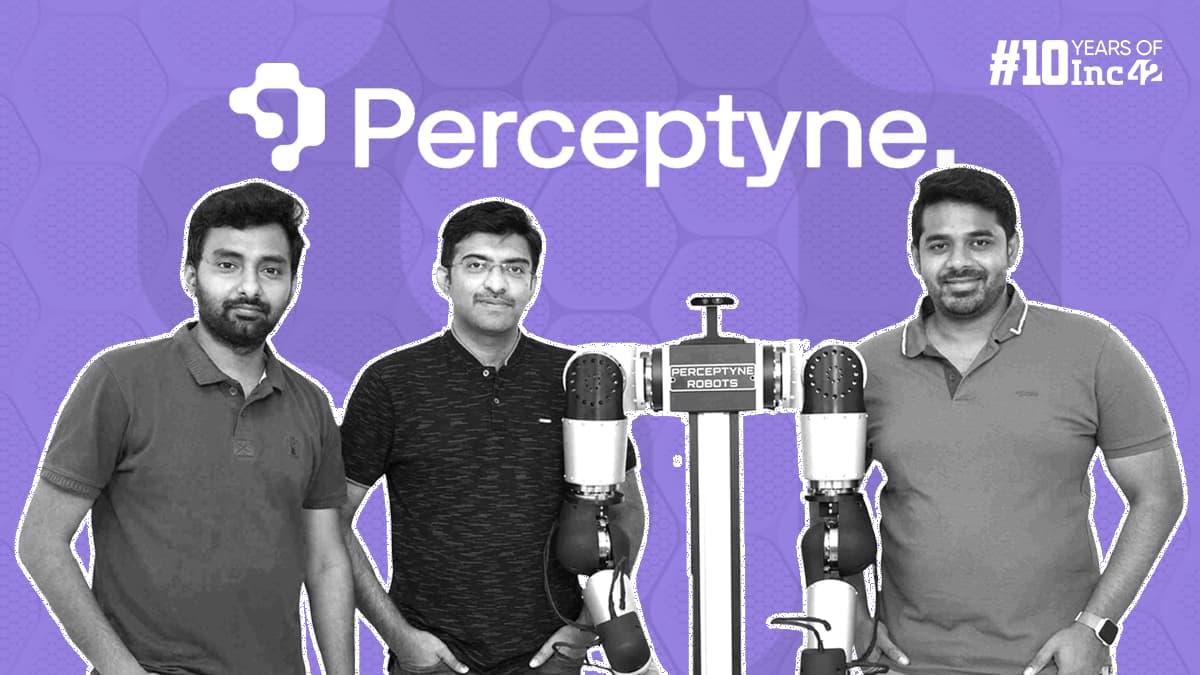Inc42
4d
270

Image Credit: Inc42
Can Perceptyne’s Robot Army Become The New Growth Engine For ‘Make In India’?
- Perceptyne Robots, headquartered in Hyderabad, develops dexterous robots which are capable of replicating human-like precision needed to perform intricate tasks across industries. Raviteja Chivukula, the founder, believes in creating an army of human-like robots equipped with tactile sensors and AI-driven no-code trainability. Incepted in 2021, the startup has two flagship robots that are capable of performing varied tasks from assembling torchlight, headlight to automotive brake assembly and mobile phone assembly.
- Perceptyne's robots are significantly more intelligent than the likes of ABB, Yaskawa, and other industrial robots, which can perform only a specific set of tasks. The company has designed its software in-house using NVIDIA's foundational models in computer vision and comes with no-code programming capabilities. The hardware components, like motor controllers and gearboxes, which are not generic to the robotics industry, can be used separately across patient biomechanics.
- Perceptyne Robots has raised $3 Mn from Endiya Partners, Yali Capital, Whiteboard Capital, and a few other angel investors. The startup plans to deploy its robots in the ecommerce warehouses and food industry plants, with manufacturing and automotive industry being their primary focus. Perceptyne's immediate priority is to roll out its robots in India, followed by the US market.
- The robotics industry is set to surpass $29 Bn in size by 2029 from $17 Bn in 2024; hence the increasing competition from global leaders could be a concern for the startup. However, the labour shortage in the US and increasing traction towards innovation make it a considerable market opportunity for Perceptyne.
- The company seeks to bring scalibility to robots that can perform highly complex tasks, one which Chivukula mulled over a decade ago while interning for a company creating vending machines. The founder is convinced that AI-driven general-purpose robotic automation is the future, and this conviction is what led to the incorporation of his robotics start-up.
- Perceptyne's two flagship robots that can perform varied tasks are named PR-9D and PR-34D. The company sees a vast market opportunity for its robots in the US and plans to enter after deploying robots in India.
- The startup aims to employ its robots primarily in e-commerce and food industries once the robotics are used widely in the manufacturing and automotive industry. Initially established in 2021, the startup operation began in 2022.
- Perceptyne's PR-9D and PR-34D are semi-humanoid robotic arms equipped with AI-driven no-code trainability and tactile sensors that are designed to disrupt the electronics and automotive manufacturing sectors.
- Perceptyne's software comes with no-code programming abilities and is developed in-house, using NVIDIA's foundational models in computer vision. The startup designs most of its hardware in-house, including motors and gearboxes that are patient biomechanics-specific and cannot be used standardly across other robotics domains.
- Perceptyne intends to stay away from robotics use cases requiring locomotion, which founder Chivukula feels are well-covered by other robots.
Read Full Article
16 Likes
For uninterrupted reading, download the app